"How to hold my life together when the world is in crisis?"
Not a pep talk. Not a to-do list. Just the science and humanity of still showing up.
Your Question:
"Whenever I see something terrible happening in the world, I feel scared, angry, and helpless.
But also, I have deadlines. Chores. A body to feed. And that makes me feel selfish and confused. Like, how can I think about meal prep or sleep when there’s so much suffering? What’s the point?
But when I ignore my routines, I spiral. I feel worse. I snap at people. I stop working. I get health problems. Then I feel guilty for that, too.
I’ve tried telling myself to just be strong or ignore or just do the next right thing, but it doesn't work. I feel so stuck. What do I do?"
Answer:
When I read your question, I thought about that moment.
You know that moment?
When you’ve been trying to hold it together in a difficult situation, yet everything still seems to be falling apart.
But then someone walks in. A song plays. A text comes. A call. A hug. Something.
And suddenly, you allow yourself to feel your feelings. The pain floods in. The tears come.
My most intense version of that moment was from my second accident, when my left leg was crushed and stuck under the toppled rickshaw. I couldn’t feel pain. Just shouted - “HELP!”.
But the moment some passersby lifted it off my leg, I started crying. Loudly.
I felt safe enough to feel the pain and act on reducing it. (go to the hospital)
All of us have had our own versions of that moment.
When we finally felt safe enough to feel our feelings.
This article is meant to be that moment for you.
Not a “fix you” plan. Not a toxic positivity slap.
But a pause. A hand on your shoulder. A hug.
A space to feel what’s true.
So that whatever action you decide to take next, it actually helps you instead of creating more guilt.
In here, we’ll name what’s happening.
We’ll answer some questions you’ve been struggling to answer.
And after that, if you feel ready to change?
I’ll be right here, helping you figure out the “how” part with evidence-based skills and tools.
You can use them only if you want to.
Ready?
Q: Why does everything feel so hard right now? Even eating or working feels strange.
Your body is trying to help you survive. It’s constantly scanning for danger—physical, social, and emotional.
And when it detects a threat, even from a phone screen, it activates emergency mode:
Tunnel vision
Shallow breathing
Irritation
Restlessness
Everything slows down… except your fear.
This is cognitive overload: too many things in your brain’s little backpack.
Q: Brain’s backpack? What’s that?
Yup. Your brain carries a little backpack every day. That’s your cognitive load.
Each day, you fill it with everyday life stuff:
What to eat
Work tasks
Family time
What to wear
What will happen to the character in your favourite show?
But with scary global issues, your backpack fills up with extra weight:
News alerts
Difficult conversations
Imagined futures
Worries you can’t solve
Panic scrolling
Heavy and overloaded, your brain begins to compensate.
It drops one thing from the backpack. Then another.
And what gets dropped first?
Usually, the boring but essential parts of your life:
Eating something nutritious
Moving your body
Meaningful connection
Doing a task that matters
Not because you’re lazy.
But because your brain has limited space in the little backpack.
And it is prioritising big new threats over regular stuff.
Q: But in addition to being hard to do, I also feel guilty if I try to focus on my needs when others are suffering. What is that?
Yes, there’s often a second voice layered on top of the fear:
“How can I care about my deep sleep or daily walk when other people are fighting for their lives?”
This guilt feels moral: “I’d be a bad, selfish person if I didn’t feel guilty.”
But guilt adds further to the cognitive load.
And it can lead to something dangerous: Self-abandonment.
A quiet withdrawal from your own humanity.
Telling yourself your experience doesn’t matter.
That you don’t get to be scared or tired or hungry, because someone else has it worse.
But here’s the paradox:
The more you ignore your needs, the less helpful you become.
Scared people spread misinformation
Tired people spread panic
Unfed people misjudge
Burnt-out people stop showing up
There is nothing selfish about staying resourced.
There is nothing indulgent about protecting your capacity to contribute.
Q: So focusing on my needs actually helps me show up for others?
Exactly.
Tending to yourself is not turning away from the world.
It’s making sure you can walk into it with something to offer.
It moves you from coping to contributing:
You think clearly, even about complex issues
You take action without burning out
You hold perspective when others are losing theirs
You model resilience for others
You remember who you are
And from that place, your steadiness becomes someone else’s anchor.
Real-life examples:
You eat a nourishing meal → You have the energy to help someone else
You do your work → You become powerful and resourceful enough to donate, advocate, provide required services, create jobs or content
You sleep before replying to that urgent text → Your response is thoughtful, not reactive
Caring for yourself → preserves your clarity → protects your values → fuels your contribution
You’re not choosing between your life and the world.
You’re choosing to hold both.
Q: But how do I actually do that? How do I hold both?
There’s a skill that can help. One that you already use every time you care for someone else who’s suffering.
It’s called self-compassion.
Not the woo woo Instagram kind.
The evidence-based skill, by Dr. Kristin Neff, built from three parts:
Mindfulness — Noticing what you’re feeling, without getting hijacked by it
Common humanity — Remembering that suffering is part of being human
Self-kindness — Treating yourself like a loved one, which gives you the safety to make difficult but necessary changes
Imagine you saw a child fall and scrape their knee. You wouldn’t say, “Oh well, others have it worse.”
You’d tend to the wound. Even if they were crying, even if it hurt. That’s compassion.
Self-compassion is the same thing, just turned inward.
It’s not “be positive.” It’s not “just keep going.”
It’s: “This hurts. And I can meet it with care.”
Sometimes that care is rest.
Sometimes it’s action.
It’s never self-pity. It’s never denial.
It’s choosing what helps you move forward.
It’s a steady hand on your own shoulder that says, “You matter too.”
Here’s what it looks like in real life:
You open your laptop to finish a task, but your mind is foggy. You stare at the screen, reread the same sentence, then check the news, then your email, then Instagram, then WhatsApp. You're overwhelmed but trying to look productive.
Without self-compassion:
“I’m so useless. Why can’t I just focus? Everyone else is doing fine. (isolation) Ugh, I’m wasting time again.” (self-judgment)With self-compassion:
“This is hard. Of course, I’m distracted. There’s so much going on. (mindfulness)
I’m not the only one struggling to work under pressure. (common humanity)
What do I need right now? Maybe I want to step away for 10 minutes, drink some water, reset, and come back with a fresh mind. (self-kindness)”
And the research is clear:
People who practice self-compassion are more resilient and more effective at helping others.
(Interested in more? You can try Dr. Neff’s guided practices here: self-compassion.org/practices)
Q: And what if I try to cope and contribute but still feel powerless?
That feeling of helplessness, and nothing you do matters? It comes from your attention being pulled toward everything you can’t control.
There’s a science-backed concept that helps here: Internal locus of control.
It means: Believing your actions can influence outcomes in your life, even in hard times.
It helps you focus on what you can influence, even when the world feels too big.
You can’t control the news cycle. But you can:
Choose one reliable source
Set a time window to check it
Mute the chaos
You can’t fix the world alone. But you can:
Eat a nutritious meal with your family or friends
Become an example of a compassionate human for the next generation
Support the change you want to see in the world through your work, inclusivity, donations, voting, asking questions, conscious consumerism, content creation, etc.
Each act, no matter how small, is you saying: “I exist. I’m not frozen. My actions shape the world.”
They really do. All of our actions collectively shape the world.
Remember these lines from this beautiful song?
“Boond boond milne se banta ek dariya hain. Boond boond saagar hain, warna ye saagar kya hain?” (A river is formed by the coming together of drops. A sea is just many drops. Without the drops, what is a sea?)
“Ek naa hum ho paayein toh, anyaay se ladne ko, hogi koyi janata hi nahin. Phir naa kehna, nirbal hain kyun haara.” (If we do not come together to fight injustice, there will be no people to stand up against injustice. Then don’t ask why the weak were defeated.)
Q: I want to know where to start. What do I do with the brain overload?
Yes. Your brain’s backpack is a good place to start.
Many people I work with want to repack their brain’s backpack in a way that helps them move forward.
If that resonates with you, here's a tool you can choose to try:
Balance Your Brain’s Backpack Tool
Find a real bag or backpack near you.
Hold it in your hands.
Imagine it is your brain's backpack (your cognitive load)
Open it. Ask yourself:
What’s taking up space right now?
What essentials are missing?
What’s one small choice I can make to adjust this backpack by just 1%?
You might notice:
A giant “worry box” spilling anxiety across your day
A big colour-coded file of a million to-do tasks too heavy to carry
A big bag of guilt about ghosting your 1000 healthy habits and responsibilities
3 boxes of panic news updates
Maybe you want to:
Swap the giant “worry box” with a little box of 60-minute “intentional worry time”
Swap the big task file with a small card of one main to-do task for the day
Swap the big bag of guilt with a little bag of bare minimum versions of a few essential habits + intentional ghosting of others.
Swap 1 news box with a packet of rest, creativity, or connection
And if there’s no space left for something important?
Just like how, in school, you borrowed a pencil when you forgot yours, you can ask for/hire help today.
You might never pack your brain’s backpack perfectly.
But you can always choose what goes in, one mindful adjustment at a time.
Plus, you get to learn daily and balance your brain’s backpack anytime, anywhere.
Q: And what if none of this is enough?
Then just sit with me here, for a moment longer.
You’ve already made it through more than you realise.
You lived through a pandemic. You’ve faced heartbreak, uncertainty, and exhaustion before.
You adapted. You adjusted.
And you’re still here.
Across history, humans have lived through collapse and recovery.
They made fires. They raised children. They resisted, rebuilt, and reimagined.
Not after the storm, but inside it.
They kept living anyway.
So will we.
You are one of them. A human.
What you do with your attention, your breath, your hours, and your energy is part of that legacy now.
Make it count.
And every time you or someone you know wants a reminder that you have skills and choices that can protect your steadiness in the middle of a storm, come back to this article.
With compassion,
Natasha Zorana
Behaviour Change Specialist
This article is meant to provide support, behaviour change science and skills for difficult times. If you're experiencing severe distress, please reach out to a qualified mental health professional.
Have questions about a change you’re struggling with? Post a comment or Ask anonymously through this question box:


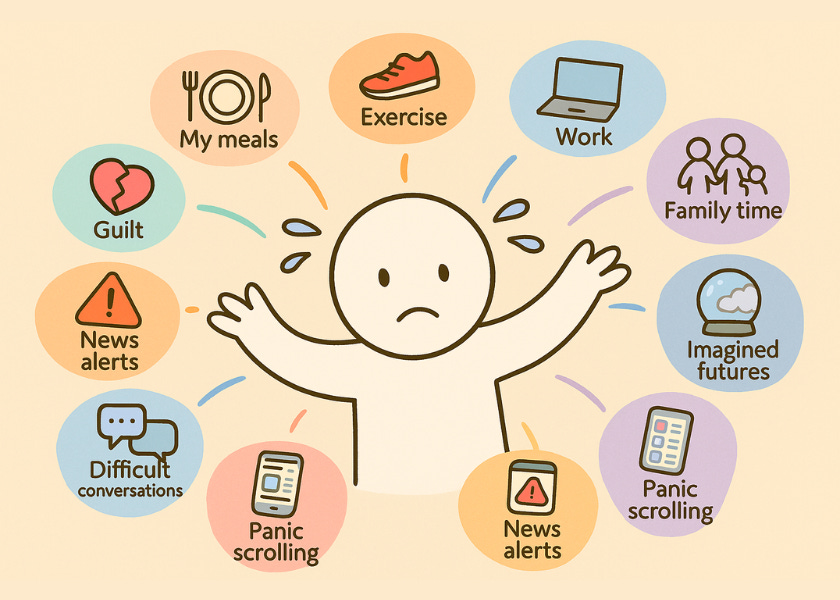
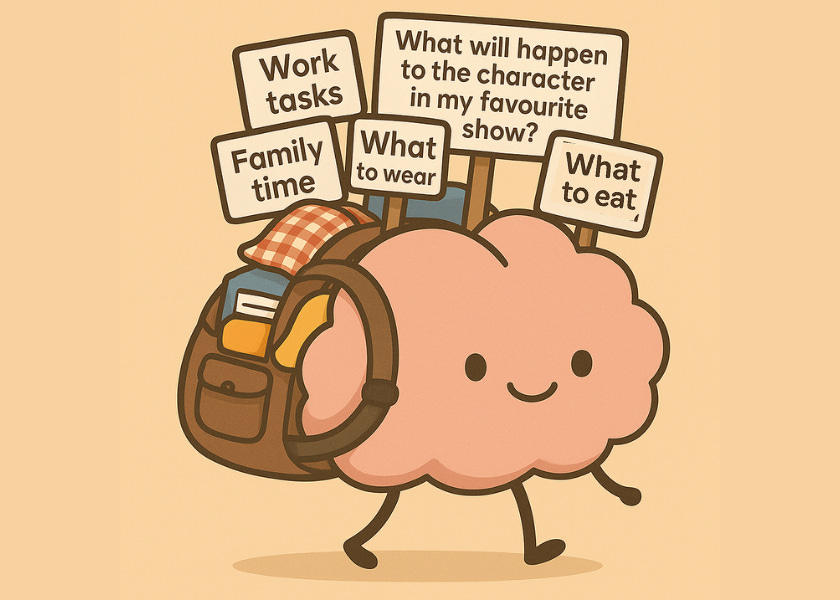
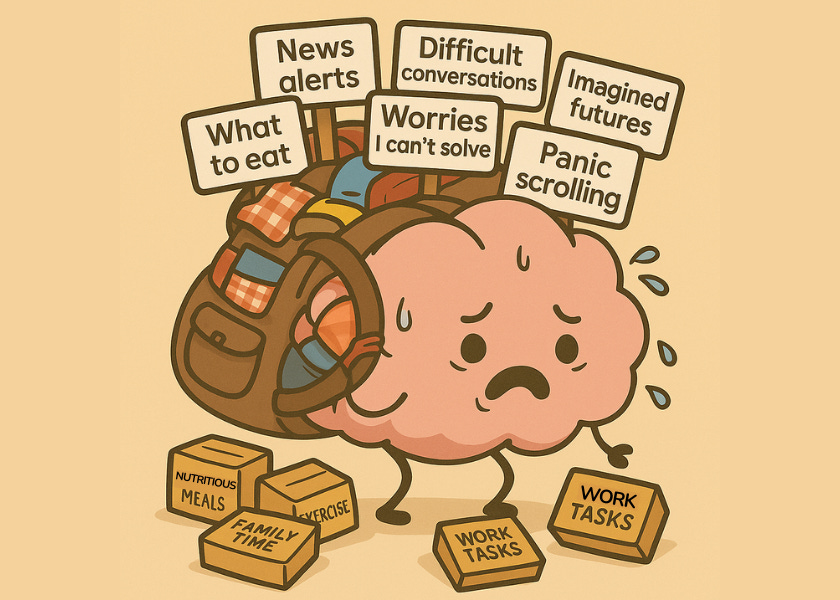
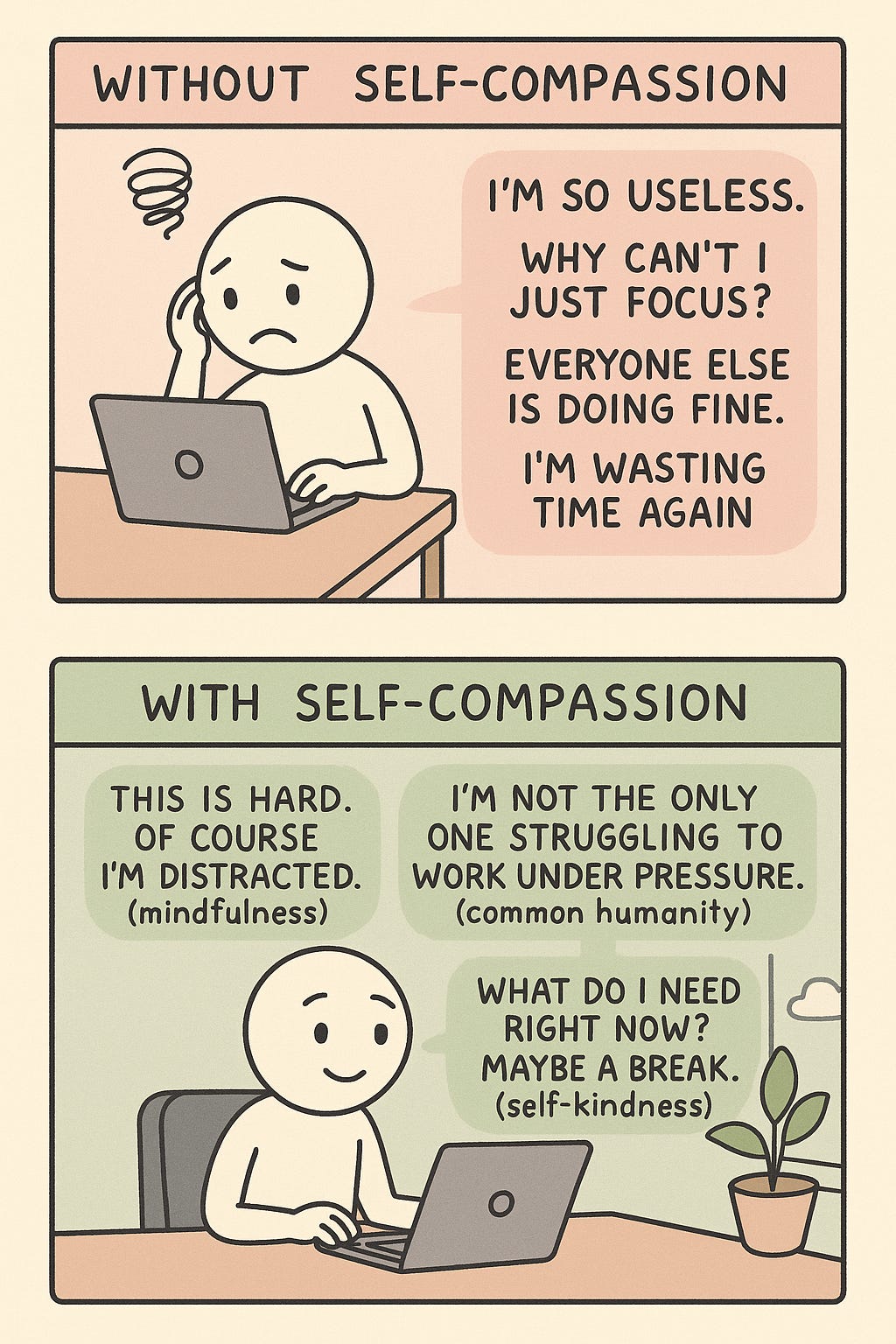
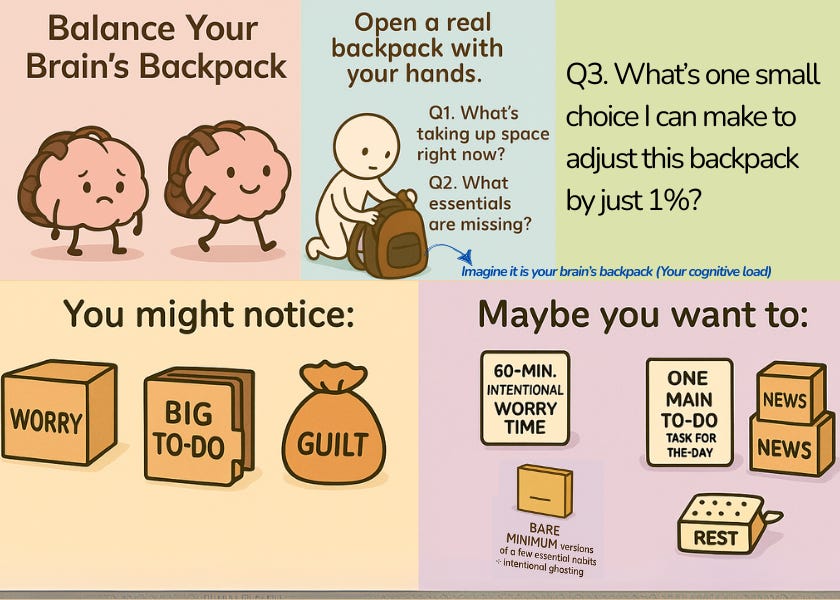
Such an amazing & fully practical post. Thank you so much.